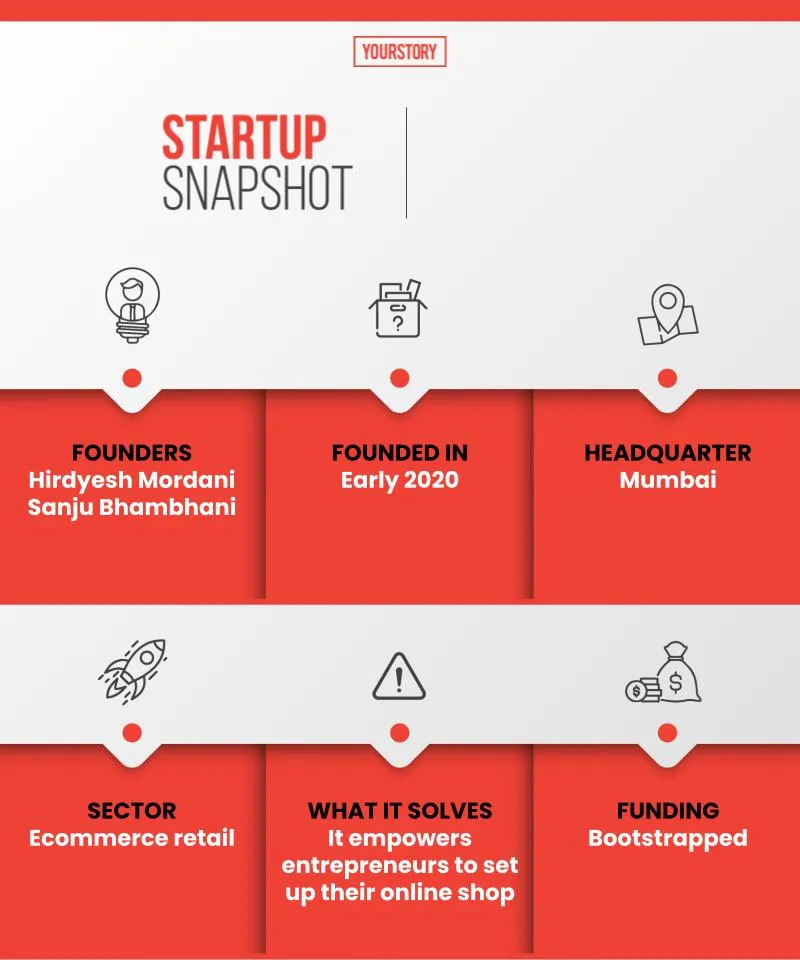These childhood friends started MyEasyStore during lockdown to enable SMB owners set up online shop
Started by Hirdyesh Mordani and Sanju Bhambhani, MyEasyStore enables SMB entrepreneurs to set up their personalised online store within minutes at a flat charge. In a year, the startup has listed 1,000 small businesses.
The COVID-19 imposed lockdown shut down many small businesses, including the street food vendors, home chefs, and other local players, who couldn’t effectively migrate to the digital platform.
Having experienced similar problems with his cloud kitchen business, Hirdyesh Mordani, along with Sanju Bhambhani, started amidst the nationwide lockdown to enable SMB owners to continue running their businesses smoothly.
Solving the problem
Hirdyesh (32) was into a cloud kitchen business that served orders directly, and through aggregators, including , , and other players.
However, as the lockdown was announced in March, and there were confusions if the cloud kitchen business would fall under necessities, he closed his business and started taking orders from his home.
“The pandemic brought unpredictable changes to every business, and the need of the hour was to survive. Though I quit my dependence on aggregators, I faced the challenges of sustaining a shop in the digital space. My DMs were flooded with questions — What all do you have on your menu? How do I place an order? What’s the price? Do you have pictures? It became chaotic and hard to manage, to say the least,” Hirdyesh Mordani, Co-founder, MyEasyStore, tells YourStory.

Meanwhile, Hirdyesh reached out to his childhood friend and software engineer Sanju Bhambhani, also the co-founder of MyEasyStore, asking him to build a microsite, where he would post answers to the frequently asked questions by customers to streamline the order processing. The microsite solved one of his biggest worries.
In fact, Hirdyesh realised that many other SMB owners must be facing similar challenges as him. It didn’t take him long enough to get in touch with Sanju again to make a problem-solving product for other SMBs.
At present, MyEasyStore has five employees.
A year of success
The duo started working on the product in April and launched the feature-flooded ecommerce platform in Mumbai in May 2020. The startup enables SMB entrepreneurs to set up their personalised online store within minutes on the MyEasyStore platform.
“This digital-first approach to their business lets SMB owners showcase and sell their products and services online and receive orders from customers directly on WhatsApp,” Hirdyesh says.
MyEasyStore enables SMB owners to take their business into their own hands — with a direct-to-consumer approach — without any dependence on developers, aggregators, or face the fear of hidden charges and commissions.
SMBs can create their online store on the MyEasyStore platform, get an update on the orders placed, and schedule them for delivery.
The startup has partnered with , Cashfree, and other fintech startups for its payment gateway to enable entrepreneurs to accept online money transaction.
At present, MyEasyStore doesn’t have any logistics facilities, leaving the owners to take charge of the delivery process by themselves. Hridyesh says it is up to the owners to select their delivery charges.
Competing with the likes of Bikayi, Dukaan, and international player Shopify, in a year, MyEasyStore has onboarded over 1,000 entrepreneurs on its platform, where home bakers, home chefs, grocery stores, kiranas, and supermarkets account for the dominant share.
Besides helping customers list their products online, Hirdyesh says that the startup also enables SMB owners to white label their brands.
“We offer two plans to the entrepreneurs. The first one is for Rs 399 per month, which allows for a limited listing of products, and the second one is for Rs 699 per month, where we offer white-label service to the businesses, with unlimited product listing features,” he explains.
Though Hirdyesh did not disclose MyEasyStore’s annual turnover, he claims that the bootstrapped startup has been running profitably.

Hirdyesh Mordani and Sanju Bhambhani, Cofounders, MyEasyStore
Challenges and the way ahead
The Indian ecommerce industry is likely to reach $99 billion, while the online penetration of retail is expected to more than double to around 11 percent by 2024 from 4.7 per cent in 2019.
In a diverse country like India, Hirdyesh says there is a scope for a lot more brand awareness and reach. “The language barrier can also be a challenge sometimes,” he adds.
He shares that explaining the benefits of going digital and adding another channel of sales is becoming challenging for him, owing to the apprehension among SMB owners to moving away from traditional means.
Moving forward, the startup aims to integrate logistics services in its plan, enabling hassle-free order deliveries for its customers.
“We support local and want to make sure no bhajiwalla (vegetable vendor) or baker is left feeling overwhelmed with the concept of setting up shop online,” Hirdyesh says.
Edited by Suman Singh









